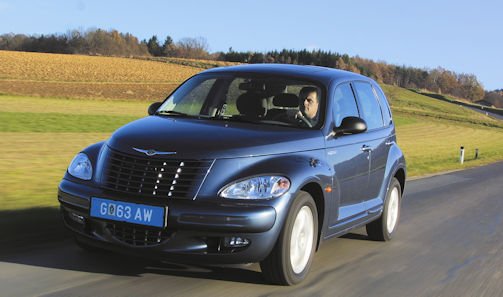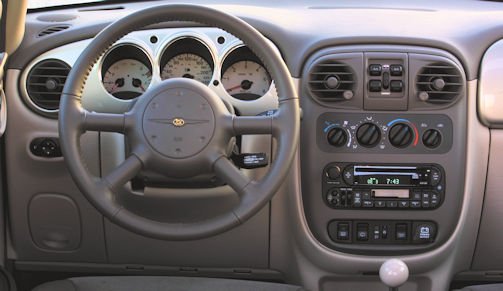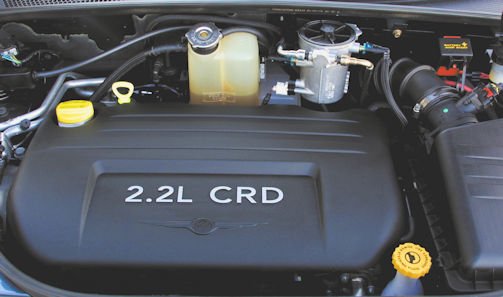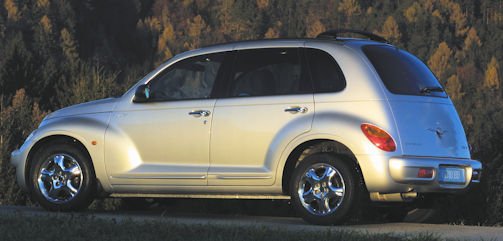Chrysler PT Cruiser
 |
|
|
Manufacturer: |
Chrysler |
|
Production: |
2000-2010 |
|
Class: |
Motor Car |
|
Engine Type: |
Gasoline, Diesel |
|
Engine Displacement: |
Gasoline 1.6-2.4 liters |
|
Engine power: |
Gasoline (85-164 kW) |
|
Wheelbase: |
2616 mm |
|
Length: |
4288 mm |
|
Width: |
1748 mm |
|
Height: |
1539-1665 mm |
|
Weight: |
1441-1605 kg |
The Chrysler PT Cruiser is a car model made by the American manufacturer Chrysler. The abbreviation PT stands for "Personal Transportation", which was built from early 2000 to summer 2010.The Chrysler PT Cruiser has front-wheel drive and is approved for five people. In the cabriolet variant, the mass increased by about 68 kg due to the reinforced vehicle structure. In Euro NCAP - Crash Test Chrysler PT Cruiser reached 3 out of 5 stars in occupant safety and one of five in the pedestrian safety.
History
Prior to the production model, a preview of the Chrysler PT Cruiser was given with several concept vehicles . The first was the Plymouth Pronto , presented at the 1997 North American International Auto Show (NAIAS) , the second of the Chrysler Pronto Cruizer at the Geneva Motor Show in 1998 and, third, about the same time as the production model, the Chrysler Pronto Cruizer AWD , at NAIAS 1999 designed by designer Bryan Nesbitt as an interpretation of the Chrysler Airflow with Dodge Neon Elements, but built on its own platform (PT platform).
Even after the presentation of the production model, some concept vehicles based on the Chrysler PT Cruiser were presented, most of which did not go into series production, including the Cruiser and the GT Cruiser (production model: PT Cruiser Turbo) at the NAIAS 2000, the concept car for the cabriolet variant at the New York International Auto Show(NYIAS) 2001 or the Chrysler California Cruiser with a preview during the Pebble Beach Concours d'Elegance 2002 and a public premiere at the Mondial de l'Automobile 2002. The PT Cruiser is built on an all-new unibody platform, and some of its mechanical components are similar to the subcompact Neon sedan's. The only engine at first is a 150-horsepower version of Chrysler's familiar 2.4-liter 4-cylinder, linked to 5-speed manual or optional 4-speed automatic transmissions.
The car was from February 2000 until 9 July 2010 in the Chrysler plant Toluca ( Mexico ) built. In addition, the units equipped with diesel engines from July 2001 to July 2002 initially mounted exclusively in the Austrian Eurostar automobile factory . When the location Graz for the PT Cruiser as too expensive proved, took over the Toluca factory assembly of the equipped with diesel engines units.
This retro-styled 4-door wagon with many options over the years including available heated front seats and yellow pearl paint.
The production of the convertible began in January 2004 In spring 2004 production version of the four-seat Chrysler PT Cruiser Convertible followed with soft top at the NAIAS 2004. In the spring of 2006, the PT Cruiser received a facelift , which was presented in mid-2005. The front view with new headlights and the interior with new colors and materials was mainly Modified. The engines were also revised slightly. Standard features include a removable 65/35 split-fold rear seat, multi-position rear parcel shelf, air conditioning, tilt steering wheel, floor shift console, and rear wiper/washer on a one-piece liftgate. An optional Touring Group includes a firmer suspension and 16-nch wheels to replace the base 15s. Optional 4-wheel antilock disc brakes supplant rear drums and are bundled with traction control.
The Limited Edition package includes the Touring Group, plus leather upholstery, power moonroof, and a fold-flat front passenger seat. That seat is also included in the 2-F option package, and some of the other tems are available separately. Front and rear power windows are standard. Both are now controlled by switches on the dashboard; previously the rears were operated only by switches at the base of the center console. Those switches remain for use by rear-seat passengers.
The PT Cruiser is therefore content to keep up with the competition in terms of safety and mechanics, two elements that do not alter its outward appearance. Its silhouette therefore remains the same since its very beginnings, while the front end still features a prominent snout, small headlights, and a hot rod-style hood.
The rear end, while still controversial, features the same shape as the original, with its vertical tailgate serving as a rear door. Obviously, opinions will be divided as to the vehicle's beauty. It's not difficult to know what people think of the PT Cruiser. They either love it to bits or hate it to the point of disgust!
Chrysler caims 26 different seating/cargo configurations with the available fold-flat front passenger seat, but you'll have to fold or remove the rear bench for cargo of any size because there's only grocery-bag space with that seat in use. Both rear-seat sections have convenient carry handles and built-in rollers. They're still a bit cumbersome, but not unduly heavy: The larger portion weighs 60 pounds, the smaller 38. Tall and fairly wide rear doors provide plenty of space for slinging them in or out, to the added benefit of passenger access. The load floor is low and flat,and the rear wheel arches don't steal much space. Interior storage is plentiful.
Cruiser's cabin is plenty roomy for four adults and maybe a rear center-seater who doesn't mind a little crowding. The high body build gives all riders abundant head clearance even beneath the power moonroof. Seating is comfortably chair-height, and even 6-footers have good leg space behind a tall front occupant.
Chrysler carries Cruiser's sense of style into the instrument panel, which is tidy and generally well arranged. Audio units sit below dial-type climate controls and are easy to reach and operate.

The retro design continues inside with a vintage-inspired dashboard. A four-spoke steering wheel and three large gauges are reminiscent of the racing cars of the past. As for the center console, it incorporates the brand's signature elements, with the radio in the center and the controls at the bottom. The seats are very comfortable and provide good support. when cornering, provided you don't overdo it. The rear seats are generous and easily accessible, which is unfortunately not the case when you want to sit in the back of the convertible version. The location of the front seat belts and the presence of safety belts require you to use bold strategies before attempting the access maneuver. Once seated, however, you'll notice that the space is sufficient and the seatbacks aren't positioned too vertically compared to some other convertible models.
The PT Cruiser comes in different versions.
At the bottom of the scale, the base version with its 4-cylinder liter engine provides the driver with a meager 150 horsepower. In this case, fuel consumption is recommended, but rest assured that performance is not what characterizes this model. It's wiser to opt for the automatic transmission, which does an admirable job with the limited horsepower available. In the middle of the pack is the Touring version, which offers several standard options, including the choice of a 180-horsepower turbo engine. This engine seems best suited to the PT Cruiser, especially when equipped with a manual transmission. Performance is very acceptable, and fuel consumption is quite good.

Engine diesel (ECE): 4-cylinder, in-line, 88 x 88.3 mm, 2148 cm³, compression ratio 18.1:1, 110 kW/150 hpat 4200 rpm, 332 Nm from 1600 to 2600 rpm, diesel.
Engine design: 2 overhead camshafts, direct injection, single turbocharger, intercooler. Performance: Top speed (factory) 183 km/h.
The type designation of the PT Cruiser differs depending on the body shape and the side on which the steering is located. The closed model with left-hand steering is designated as type FY, and as right-hand drive type FZ. In the convertible, on the other hand, the type designation JY has been used for the left-hand drive and JZ for the right-hand drive.
STANDARD EQUIPMENT: (Original)
Base: 2.4-liter dohc 4-cylinder engine, 5-speed manual transmission, dual front airbags, air conditioning, power steering, tilt steering wheel, front bucket seats, center console, cupholders, split folding rear seat, power windows,AM/FW cassette, tachometer, rear defogger, rear wiper/washer, visor mirrors, variable intermittent wipers, auxiliary power outlet, floormats, dual out-side mirrors, 195/65R15 tires, wheel covers.

Technical
-
Technical data
model
Engine type
capacity
Max. power
Max. torque
top speed
Fuel consumption
per 100 kmconstruction
1.6
gasoline engine
1598 cc
85 kW (116 hp) at 6300 rpm
157 Nm at 4550 / min
176 km / h
7.7 l
2001-2010
2.0
1996 cm³
104 kW (141 hp) at 5700 rpm
188 Nm at 4150 / min
166 km / h (2) / 190 km / h
7.2 l
2000-2004
2.4 (3)
2429 cc
105 kW (143 hp) at 5200 rpm
214 Nm at 4000 rpm
195 km / h
9.4 l
2004-2009
2.4 Turbo(4)
164 kW (223 hp) at 5100 rpm
332 Nm at 3950 / min
205 km / h
10.2 l
2003-2006
2.2 CRD (5)
diesel engine
2148 cc
89 kW (121 hp) at 4200 rpm
300 Nm at 1600-2600 / min
183 km / h
6.9 l
2000-2005
2.2 CRD
110 kW (150 hp) at 4000 rpm
300 Nm at 1600-3200 / min
183 km / h
6.7 l
2006-2010
(2) on vehicles with automatic transmission
(3) In the US from 2000 to 2003
(4) In the US only with automatic transmission and 132 kW (180 hp)
(5) Engine of the OM 644 series from Mercedes-Benz OM 611 and OM 646 developed
-Note: in depth Technical details Maintenance and Repair Manuals available for registered users-
